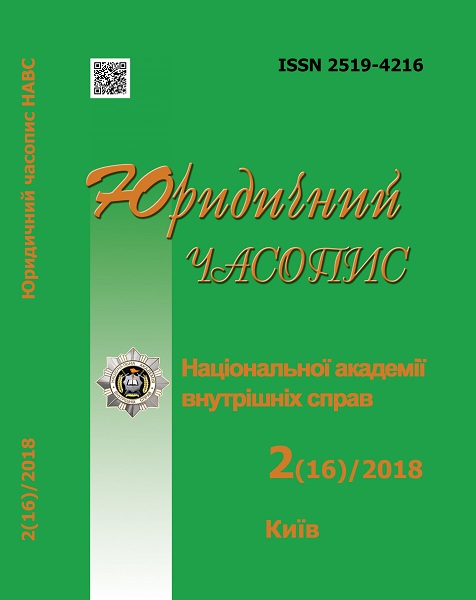Organizational and Legal Principles of Activity Bodies of Public Registration of Activities of the Civil Situation in the Field of Countervailing Violence in the Family at the Stage of the Planning of the Slave
Abstract
The issue of domestic violence, due to the widespread spread of this phenomenon in society, is viewed on a national and international level as a major problem. Its solution depends predominantly on the quality of legal regulation and the precise and coordinated work of public authorities. The main aspect of such activities is the provision of human rights and freedoms, public order and security, the creation of mechanisms for prevention and control of this phenomenon. Despite the public interest in this issue, both from the state, from civil activists and from the citizens themselves, the issue of domestic violence has not yet been resolved and requires the search for new approaches to prevention and struggle. The purpose of the paper is to formulate proposals for amending the legislation and optimizing the activities of the state registration bodies of civil status and their interaction with other authorized bodies on the basis of analysis of the current legislation, powers of state authorities in the field of counteraction to domestic violence, with the aim of prevention of domestic violence at the stage of marriage. In the process of research were used general scientific and special methods of knowledge of legal phenomena, in particular dialectic, comparative law, formal legal method, method of analysis and synthesis. All measures to combat domestic violence are divided into two groups – prevention and counteraction to violence. In this study, the authors focus on measures to prevent violence in the seven, and explore the mechanism of their application at the stage of marriage. The authors see fit to introduce in the family law and practice of marriage a rule on the awareness of brides about the fact that they participate in domestic violence as an abuser. To this end, it is necessary to carry out a set of measures of organizational and legal nature both for legislators and executive authorities. Firstly, it is necessary to complete work on the introduction into the operation of the Unified State Register of Domestic Violence and Gender-Based Violence. Secondly, it is expedient to regulate the interconnection of state bodies in such a way that access to this register was provided by state bodies for registration of acts of civil status. Thirdly, in addition to the introduction of the designated Register, it is necessary to carry out a package of changes to the family law and legislative acts regulating the activities of the justice bodies. In particular, it is proposed to supplement the Family Code of Ukraine with Article 301 – Mutual awareness of the brides about the fact of being registered in the Unified State Register of cases of domestic violence and violence on the basis of gender as an offender. In the Law of Ukraine «On State Registration of Civil Status Acts» (Article 14 «State Registration of Marriages»), it is proposed to establish a rule on the need for brides to be informed about the possibility of being informed of the presence/absence of another fiancée in the Register. It is proposed to reconsider the provisions of the Law of Ukraine «On Prevention and Combating Domestic Violence» in terms of determining the term of storage in the Register of Personal Data on Offenders who were prosecuted in order to ensure the satisfaction of the information request of the brides.
Downloads
Abstract views: 151 PDF Downloads: 99
Copyright (c) 2019 Law Magazine of the National Academy of Internal Affairs

This work is licensed under a Creative Commons Attribution-NonCommercial-NoDerivatives 4.0 International License.
- Authors reserve the right to authorship of their own work and transfer to the magazine the right of the first publication of this work under the terms of the Creative Commons Attribution License, which allows other persons to freely distribute published work with mandatory reference to authors of the original work and the first publication of an article in this magazine.
- Authors have the right to enter into separate additional agreements on non-exclusive dissemination of the work in the form in which it was published in the journal (for example, to post an article in the institution's repository or to publish as part of a monograph), provided that the link to the first publication of the work in this journal is maintained.
- The journal's policy allows and encourages the posting of articles by authors on the Internet (for example, in electronic storehouses of institutions or on personal websites), both before the submission of this manuscript to the editorial office and during its editorial processing, as this contributes to the creation of a productive scientific discussion and positively affects the efficiency and dynamics of citing the published work.




